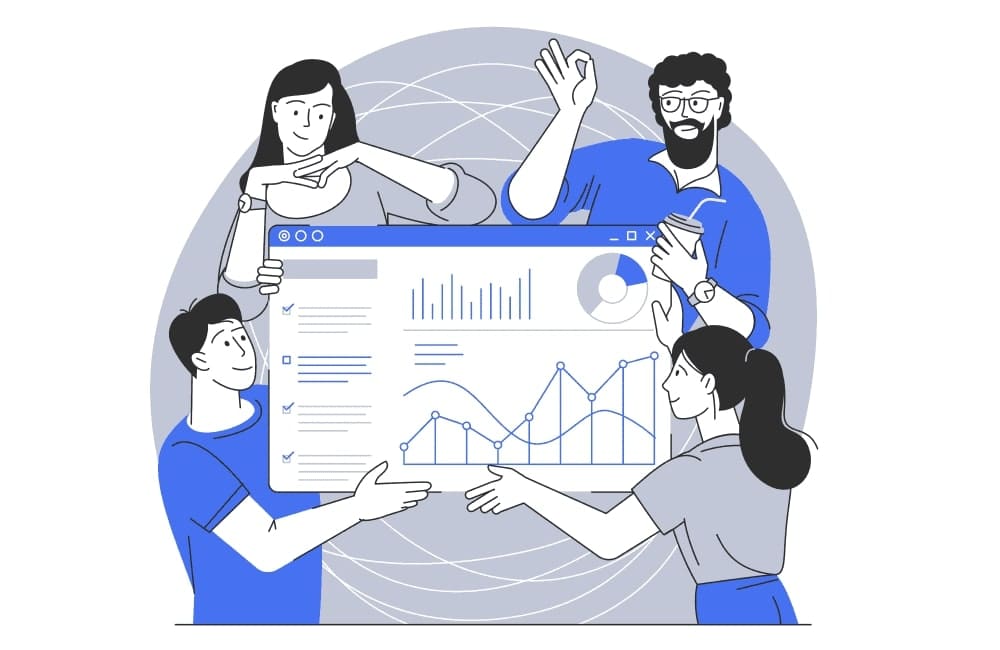Salesforce is a powerful cloud-based Customer Relationship Management (CRM) platform that enables businesses to connect more effectively with customers, streamline sales and marketing operations, and drive scalable growth. From lead generation to customer retention, Salesforce provides businesses with the digital tools they need to compete and thrive in a fast-evolving market.
But to unlock the full potential of Salesforce, expert implementation and strategic use are essential. This is where a certified Salesforce consultant becomes indispensable, guiding businesses through configuration, customization, integration, and continuous optimization.
A Salesforce consultant is a Salesforce-certified professional with specialized knowledge in CRM strategy, platform configuration, business analysis, and industry-specific use cases. These consultants help companies align Salesforce features with their organizational goals, ensuring efficient workflows, increased productivity, and high user adoption.
Their expertise spans initial setup, custom development, system integrations, workflow automation, and performance reporting, making them critical to Salesforce success.
Table of Contents
ToggleWhat are the Benefits of Hiring a Salesforce Consulting Partner?
Integrating Salesforce into your business ecosystem can be a game-changer. But doing it right requires both technical expertise and strategic insight. A Salesforce consulting partner brings CRM implementation experience, certified Salesforce skills, and platform-specific knowledge. Partnering with a Salesforce consultant offers a range of benefits that maximize your return on investment (ROI) and ensure your platform aligns with business goals, customer experience initiatives, and long-term digital transformation efforts.
Streamlined Implementation and Customization
Working with a Salesforce consultant makes setting up Salesforce much easier and more effective. Their experience helps make sure everything works right from the beginning.
Avoid common problems
Consultants are aware of the common mistakes businesses make when starting with Salesforce, such as incorrectly moving data or struggling to get people to use it. They help you avoid these issues and make sure your setup goes smoothly.
Customize Salesforce for your business
Salesforce can do a lot, but knowing how to adjust it to match your company’s way of working takes skill. A consultant will design and develop dashboards, reports, and workflows tailored to your team’s needs and goals.
Move your data and connect your systems
Moving old customer data into Salesforce can be a challenging task. A consultant develops a plan to transfer your data safely and accurately. They can also connect Salesforce to other tools you use, like marketing or accounting software, so all your systems work together.
Increased User Adoption and Productivity
Even the best CRM doesn’t help if your team doesn’t use it. A Salesforce consultant makes sure your team understands how to use Salesforce and feels comfortable doing so.
Build easy-to-use workflows and automation
Consultants create simple processes that help your team save time on daily tasks. With automation, your sales, marketing, and service teams can work more efficiently and effectively.
Offer Salesforce training that fits your team
A consultant provides training that’s made for your company and roles. This helps everyone learn how to use Salesforce features effectively.
Encourage your team to use Salesforce
With the proper support and communication, consultants help your team feel good about using Salesforce. They help your company maximize the platform’s potential.
Data-Driven Decision-Making and Improved Sales Performance
Salesforce has a lot of useful customer data, but it’s only valuable if you know how to use it. A Salesforce consultant helps turn that data into smart business decisions.
Use reports and dashboards to gain insights
Consultants set up clear dashboards that show valid data about your sales, customers, and marketing results—all in one place.
Build smart sales strategies from customer data
By analyzing customer trends, consultants help you create sales plans that align with your customers’ needs and preferences. This makes it easier to close deals and grow your business.
Forecast sales and manage your pipeline better
Consultants help you see what’s coming in your sales pipeline. This enables you to identify problems early, plan effectively, and make more informed business decisions.
Why Do We Need a Salesforce Consultant?

While Salesforce offers a user-friendly interface and extensive resources, implementing and customizing it to perfectly align with your unique business needs can be daunting, especially for businesses entering the CRM landscape for the first time.
Here are the key reasons why a Salesforce consultant is beneficial, but often essential for maximizing the value of a Salesforce investment.
Complexity of Salesforce Platform
Wide Range of Features: Salesforce offers an extensive range of features and functionalities. Navigating this complexity without expert guidance can result in underutilizing the platform’s full potential.
Customization and Scalability: The platform’s strength lies in its customization and scalability. A Salesforce consultant possesses the expertise to customize and scale the Salesforce environment according to business growth and changing needs.
Alignment with Business Goals
Strategic Implementation: A consultant ensures that the Salesforce implementation is technically sound and strategically aligned with business goals, driving growth and efficiency.
Change Management: Implementing Salesforce affects various aspects of a business. Consultants facilitate change management, ensuring a smooth transition and alignment with long-term objectives.
Maximizing ROI
Avoiding Common Pitfalls: Businesses frequently encounter pitfalls during Salesforce implementation, including data duplication and workflow inefficiencies. Consultants help avoid these, safeguarding your investment.
Driving User Adoption: The success of Salesforce implementation heavily depends on user adoption. Consultants deploy strategies to engage users, ensuring high adoption rates and maximizing ROI.
How Does Salesforce Benefit Customers?

Salesforce isn’t just a boon for businesses; it offers many customer advantages. Salesforce fosters a more personalized and efficient customer experience by empowering businesses to leverage customer data. Here’s a breakdown of how Salesforce directly benefits customers:
Improved Communication
Salesforce provides businesses with a centralized platform for managing all customer interactions. This allows them to track communications across different channels and ensure consistent messaging throughout the customer journey.
Personalized Experiences
Salesforce enables businesses to gain a deeper understanding of their customers’ preferences and buying habits. This enables them to tailor their offerings and communications to individual customer needs, resulting in a more relevant and personalized experience.
Faster Resolution of Issues
Salesforce equips businesses with efficient case management tools. Customer service representatives can access all relevant customer information and communication history in one centralized location, enabling them to resolve issues promptly and accurately.
Proactive Customer Service
By analyzing customer data, businesses can identify potential issues before they arise. This enables them to proactively approach customer service, address concerns before they escalate, and foster stronger customer relationships.
Increased Transparency and Trust
Businesses can communicate with customers more transparently when they utilize Salesforce effectively. Customers can easily access information about their accounts, orders, and service requests, building trust and loyalty.
Salesforce empowers businesses to prioritize customer relationships and deliver exceptional customer service. This creates a more positive customer experience, fostering brand loyalty and advocacy.
Why Salesforce is Beneficial for Businesses?

Salesforce has revolutionized how businesses interact with customers, offering powerful tools to streamline customer relationship management (CRM), enhance operational efficiency, and drive growth.
| Aspect | Benefits |
|---|---|
| Centralized Customer Information | Access customer information instantly from any device, anywhere. |
| Sales and Marketing Alignment | Align campaigns with sales goals using automation and lead nurturing. |
| Improved Decision-Making | Leverage real-time dashboards and analytics to guide growth strategies. |
| Scalability and Customization | Scale your CRM with flexible, customizable modules and industry add-ons. |
| Customer Satisfaction and Loyalty | Increase loyalty through timely, consistent, and proactive engagement. |
Salesforce’s comprehensive ecosystem provides businesses with a competitive edge by optimizing CRM processes, enabling personalized customer experiences, and offering the tools for data-driven decision-making. The platform’s scalability and capability for deep customization ensure that businesses of all sizes can leverage Salesforce to meet their specific needs, driving growth and fostering long-term customer relationships.
How to Choose the Right Salesforce Consultant?

Selecting the right Salesforce consultant is crucial for ensuring the success of your Salesforce implementation or optimization project. A suitable consultant can significantly amplify the benefits of Salesforce for your business, tailor solutions to your specific needs, and drive user adoption.
Checklist for Choosing a Salesforce Consultant:
| Criteria | What to Look For |
|---|---|
| Expertise and Experience | Structured approach, change management, training plans |
| Implementation Methodology | A structured, agile implementation plan with timelines and milestones. |
| Communication and Collaboration | Transparent reporting, collaborative workflows, and accessible support. |
| Long-Term Support | Ability to provide managed services, enhancements, and post-launch optimization. |
| Cultural Fit | Understanding of your business culture and alignment with organizational goals. |
By carefully considering their expertise, approach, communication skills, support offerings, and cultural fit, you can select a partner to implement Salesforce effectively and ensure its continued success within your organization.
Conclusion
At Axis Consulting, we specialize in helping organizations leverage Salesforce to achieve measurable business results. Our certified Salesforce consultants combine strategic insight, technical mastery, and industry knowledge to tailor CRM solutions that align with your goals. Whether you’re scaling customer engagement, automating sales processes, or improving data visibility, we help you transform your CRM investment into a competitive advantage.
Whether enhancing customer experiences, streamlining operations, or driving growth, Axis Consulting is your partner in navigating the Salesforce ecosystem. Choose Axis Consulting to unlock the transformative power of Salesforce for your business, ensuring a future of innovation, efficiency, and sustained success.
FAQs
What does a Salesforce consultant do?
A Salesforce consultant helps businesses set up, customize, and get the most out of Salesforce. They make sure it fits your team’s needs, works smoothly, and helps you grow.
Why should I hire a Salesforce consultant instead of doing it myself?
Salesforce can be complex. A consultant knows the platform inside and out and can help avoid mistakes, save time, and ensure you’re using the best tools for your goals.
How does a Salesforce consultant help with data migration?
They securely and accurately migrate your customer data into Salesforce. They also integrate Salesforce with your other tools, ensuring everything works together seamlessly.
Can a Salesforce consultant help my team use the system better?
Yes. They train your team, make the system easier to use, and create helpful workflows. This means your team will feel confident using Salesforce daily.
Will hiring a Salesforce consultant improve sales performance?
Absolutely. Consultants help you track sales data, plan better, and create smarter strategies. This leads to increased sales, happier customers, and more informed business decisions.